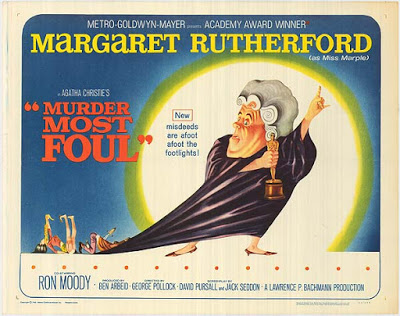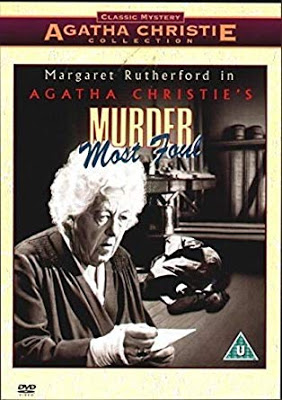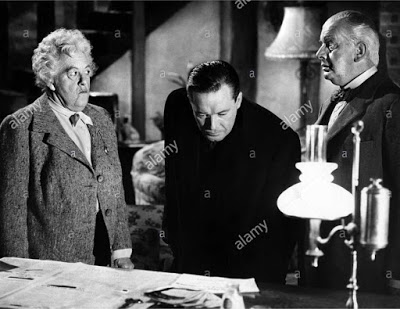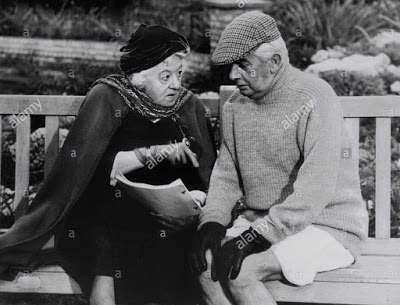Murder Most Foul
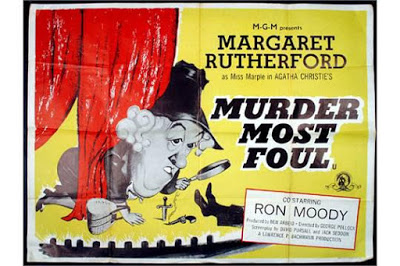
Director: George Pollack
Year: 1964
Rating: 6.0
I went to the trouble of first reading the Agatha
Christie novel that this film is based on (Mrs. McGinty's Dead), but it soon
became apparent that this was rather pointless since the film no more resembles
the book than I do to a swan in flight. You have wonder why they even bother
to credit it to one of Christie's lesser efforts. They not only switch Miss
Marple for Hercule Poirot as they had done in the previous Miss Marple film
(Murder at the Gallop) but other than the victim having the same name, nothing
else is taken from the book. In a sense, this not a bad thing because Mrs.
McGinty's Dead is a sloppy piece of work with more suspects than you can
count going to sleep and a motive that never rings as plausible. Not that
the motive in the film is much better, but since there is no real connection
to the book, I had no clue to who the killer was and when this person is
revealed it is completely out of the blue. One suspects they were chosen
by playing eenie-menee-minee- moe.
So the charm of the film really comes down to Margaret Rutherford whose simple
presence is pleasing and comforting. She so personifies a slice of England
that feels long gone and though this series was from MGM, they were shot
in England and retained a very localized personality. Much of the film takes
place in a small rundown community theater and an English B&B. I have
my experience with those B&Bs (Bed and Breakfast) and it rang true from
the lumpy beds, the grumpy landlady, the shilling to get heat and the awful
breakfast of kippers or fatty bacon that I always skipped out of like a man
on the run from the cops. These films were also shot in black and white which
is a bit surprising for a film in the mid-60's and is an indication I expect
of the budget MGM was willing to give them.
In this one Mrs. McGillicudy is found murdered (in a rather Hitchcockian
opening) and a man sent up for trial, but fortunately for him though not
for the prosecution, Miss Marple is on the jury and refuses to vote guilty
because of the rose found by the body. Why a rose she muses? As the police
(Inspector Craddock played by Australian actor Charles Tingwell who appears
in all four films being outsmarted by Miss Marple) thinks she is on the wrong
track, Miss Marple has no choice but to go undercover in an acting troupe.
She is put on to them because of a playbill she finds in the victim's room
- a play Murder She Said by Agatha Christie - the name of the first film
of course though it was never a play.
To audition for the manager played by Ron Moody (the only name I recognized
among the cast of suspects), Miss Marple recites the poem The Shooting of
Dan McGrew by Robert Service - apparently a poem that Rutherford often recited
in real life. Once ensconced among the troupe she does her usual snooping,
more murders occur as do attempts on her life until the killer is revealed.
The film quite lacks energy, suspense and the characters all are kind of
indistinct from one another. So when you know the killer you barely recall
their role in the film. One's affection or lack of it for Marple and Rutherford
will probably determine how much you enjoy the film.
Once again, her real life husband (Stringer Davis) is on hand and when they
go off walking arm in arm at the end it is quite sweet because their marriage
is said to have been a very happy one till the end - two people who found
each other in middle age and found comfort and support in each other and
by all accounts it was very much a marriage of platonic friendship. Directing
all four of these films is George Pollock, who was the Assistant Director
on some classic films The Third Man, Great Expectations, Oliver Twist, Brief
Encounter but never did a lot as a director - mainly these films and another
Christie novel in 1965 Ten Little Indians.


